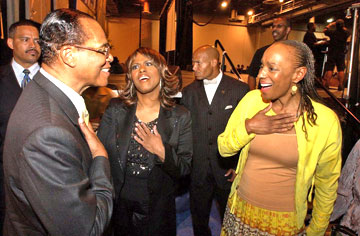
HOUSTON (FinalCall.com) – If you traveled here for the Essence Music Festival simply to party at clubs and official concerts July 4th weekend, the three days of exquisitely organized empowerment seminars were wasted on you.
The weekend also marked the official launch of Essence Cares! A Call to Action to Secure Our Youth. With an emphasis on mentoring, the initiative galvanized attendees to enlist millions of Black people to support one of the national organizations in partnership with Essence: Big Brothers Big Sisters, the Children’s Defense Fund, National Association for the Advancement of Colored People (NAACP), National Urban League, Operation Hope and M.A.D.D.A.D.S.
Now in its 12th year, it was the first time the festival was held outside of New Orleans, as a result of the devastation Hurricane Katrina left the city. The Crescent City sorely missed the boost the festival has usually brought to its coffers–over $1 billion over its 11-year period taking place in the Big Easy. While statistics were not released at Final Call press time, an estimated $126 million was brought to the New Orleans’ economy with the 232,000 attendees of last year’s festival.
While some participants complained in published reports about the lack of convenience due to Houston’s “sprawl” and costly transportation to and from events, the staff at Essence, led by Editorial Director Susan Taylor, once again beamed proudly at the festival’s successful appeal to the public.
“This year’s Coca-Cola Presents the 2006 Essence Music Festival was a tremendous success, with attendance of more than 200,000 festival-goers from all over the world, who enjoyed spectacular entertainment and participated in the historic launch of Essence Cares! A Call to Action to Secure Our Youth,” said Michelle Ebanks, president of Essence Communications Inc. “Living up to its reputation as the original ‘party with a purpose,’ the concerts were phenomenal and the daytime seminars were both inspiring and productive.”
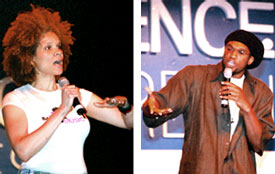
The festival kicked off under the theme “Peace is Power” on July 1, followed by a day of presentations focused on “Reawakening the Spirit” and concluding July 3 with seminars “Standing on Strong Ground.” The days were crammed with free seminars which lasted 15 minutes long, presented by an amazing spectrum of national leaders, community activists and celebrities. The evenings rocked the rafters of the Reliant Center where free, thousands swarmed to enjoy a choice of several star-studded concerts, featuring Mary J. Blige; Earth, Wind & Fire; LL Cool J; Mo’Nique and Yolanda Adams on July 1; Doug E. Fresh & The Pioneers of Hip-Hop featuring Slick Rick, Sugar Hill Gang, MC Lyte, Biz Markie, Whodini, Dana Dane, Dres, Yo Yo; New Edition and Bobby Brown Reunion; Jamie Foxx; Steve Harvey; Jaheim and Chris Brown on July 2; and Maze featuring Frankie Beverly; Toni Braxton; Cedric the Entertainer; Charlie Wilson and Keyshia Cole on July 3.
Some of this year’s participants included freedom fighter Angela Davis, actor and activist Danny Glover, Rainbow/PUSH leader Reverend Jesse Jackson, Bishop T.D. Jakes, New Orleans Mayor C. Ray Nagin, Reverend Al Sharpton, Children’s Defense Fund founder Marian Wright Edelman, inspirational life coach Iyanla Vanzant and others. For the first time, the Honorable Minister Louis Farrakhan addressed the festival, drawing the largest turnout of all three days of seminars for his keynote address on the concluding day–an estimated audience of over 3,000 people.
The audience sat attentively during the lengthy program July 3, which began with remarks from Mayor Nagin. Rev. Sharpton followed with a message chiding leadership, artists and everyday people to stand up and fight for our people instead of betraying the sacrifices of those before us.
“Martin Luther King changed American history and never had a fax machine. Malcolm X taught us who we were and never had email. You have all this technology, text messages, email, three or four cell phones,” he observed, “yet can’t get 20 people together in your neighborhood to get the drug addict off the corner.”
Bruce Gordon, president and CEO of NAACP, implored people not to quit the civil rights struggle by calling the roll of committed Black leaders in the past. He also introduced the idea of “arrive with five,” which encourages each voter to travel with five others to vote. Michael Lomax, president and CEO of the United Negro College Fund, reminded the audience of scholarships necessary to fund the education goals of our youth.
He introduced Dr. Michael Eric Dyson, author of “Come Hell or High Water,” a stinging indictment of the Bush administration for its cronyism, incompetence and ignorance combined with an “insidious indifference to poor Black people.” He posed the question: “Do we love poor Black people,” before insisting that love for the poor was requisite alongside holding government accountable.
“America showed some of the worst negligence of poor people that we have ever seen. We knew they were poor, but we just did not want to acknowledge it. We have been neglecting those people long before the hurricane ever descended,” he said. “There were 100,000 people in New Orleans who did own a car. They were not stubborn; they were not stupid. They were stuck.”
Your money where your mouth is
Reflecting the words of Minister Farrakhan that politics without economics is symbol without substance, the direction of the seminars turned toward dealing with what was in our pockets and bank account.
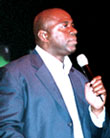
NBA legend Earvin “Magic” Johnson presented the “Building Your Wealth” workshop. His Johnson Development Corporation and the Magic Johnson Enterprises have successfully established business and community development projects and relationships, which include 100 franchises of Starbucks across the country as of August and inner-city theaters.
“We have more Black millionaires today but we have less Black business owners. That is not a good thing. Once we are successful, we move to the suburbs, then stop investing in our own communities,” he said, adding that we are losing Black franchises as well.
He explained that building a business is more about common sense than book sense, sharing some of the secrets to his success, such as making sure people who work behind the counter reflect the community, a menu that resonates with Black people and music that is in sync with our rhythms. He also recommended several avenues to increasing wealth through business, such as pooling disposable income into investment clubs; quit worrying about who is going to be the leader (whoever has the expertise you have to let them run with it, he stressed); hiring 9s and 10s, not 1s and 2s, in order to offer an equally productive type of effort; building a brand and a place where people are drawn to visit; and 10+ customer service. He also noted investments in land and home ownership, from which equity can be leveraged into other projects.
“We need to change our mindset to owners instead of people who just spend money, so that we can pass on wealth to our children instead of debt,” he stressed. “We need to have a different attitude when we talk about making money. It’s not about owning 20 cars and “bling bling” that decreases in value. It’s about land and owning buildings, which increase in value.”
Economist Julianne Malveaux took the audience through a humor-filled PowerPoint presentation, “From Broke to Blessed in Seven Steps.”
“Slaves bought themselves back. Think of the contradiction of having to purchase yourself, but they managed to manage their money to purchase themselves,” she began. “Do not tell me that the descendants of slaves cannot do better.”
Keeping Black people broke is a political act, she declared. “There is a negative rate of saving, but over 600 million credit cards in the country right now. Your dog will get a credit card application. Your child will get a credit card application,” she told the crowd.
Her process of financial freedom began with an honest assessment of how broke you are because, if you don’t know, how can you fix it? Then she implored, “Stop charging, stop shopping!,” decrying it as America’s default sport and favorite pastime.
“If you feel good, you buy. If you feel bad, you buy. Why do all roads lead to the mall? Sisters, if you get a new man in your life, you have to go shopping– ‘I got to get a new dress for the new man.’ When you break up the man, you have to go shopping– ‘I need a new dress to get me another man. I tried that other dress but it only worked for a while.’ You get a new job and you have to get new clothes for your job. You lose your job; you cannot wear those good clothes to the unemployment office, so you have to buy some casual clothes,” she recounted.
She advised the audience to examine their shopping buddies, observe casual purchases, think of shopping alternatives and a break from buying for a week.
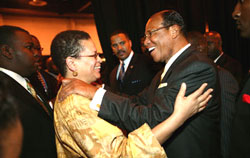
Speaking to the heart of the matter, Dr. Malveaux asked, “What kind of hole are we trying to fill that we just shop and buy? We live in an exploitative capitalist society that tells us that we are nothing, but we know that we are not. No amount of labels on our back will change our inner divinity, otherwise you will have a lot of bills and you will still be who you are.”
Step three was starting the repair process and paying down your debt. Know credit history and score, she said. Step four: Change the equation by spending less and earning more. “Do you need 128 cable channels if cutting back saves you money? Do you need 2,000 minutes on your cell phone?” she opined. Step five: Cultivate the savings habit, pay yourself first and give back in charity. Step six: Claim ownership and invest. She explained that 50 percent of Black people own homes compared to 75 percent of White people.
“We missed out on the home ownership boom because we could not pay the down payment because we had not saved or had bad credit. We need to have a healthy relationship with money,” she stressed.
Developing a plan and counting your blessings was step seven. She concluded by saying that being personally financially self-sufficient is the beginning step to organizing our people economically, before offering a brief overview of 10 money mistakes, which included treating credit like cash, ATM addictions and unaccountability, lending money to friends, ignoring the IRS and using home equity for junk.
Courage and candor
The concluding presentations were marked by heartfelt honesty that touched the soul.
Hydeia Broadbent, the 21-year-old AIDS activist, contracted the disease while forming in the womb of her IV drug-using mother who would abandon her. Adopted at less than two months old, she has survived doctors predictions that she would not live beyond her fifth birthday.
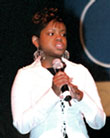
“In 2006, for African Americans to make up 12 percent of the population, but 50 percent of all new AIDS cases, doesn’t make sense. For my young Sisters 25-35, for AIDS to be the number one killer among them doesn’t make sense. To still have people dying from AIDS doesn’t make sense,” she began.
Letting a few tears fall as she shared that people tell her how healthy she looks, she revealed, “You don’t see the days when I can’t get out of bed, or in the bathroom sitting on a toilet with a bucket in front of me because it is coming out of both ends.”
She chided parents for believing it is sufficient to talk to their children about sex once, when they have to repeatedly remind their children of household tasks such as taking out the trash. “If you say, ‘It is hard to talk to my child,’ imagine watching your child die,” she boldly declared. “Those are your choices.”
She urged people of all ages to engage in open discussion, get tested and “think about what you do before you do it and ask yourself is it really worth it.”
NBA player Etan Thomas, of the Washington Wizards, graced the stage with a spoken word performance, dealing with youth. Beyond his sports, the athlete shared that he speaks at inner-city schools, before reciting a poem, “Republicans” criticizing that Party’s stance against affirmative action in schools.
“They cut the budgets of inner city schools negating attempts to rescue young Black minds, which are a terrible thing to waste/ cast in the hood, sharing used books, expected to overlook 40 nappy heads packed into classrooms like slaves/ While underpaid, underappreciated teachers attempt to communicate to the masses of minds is a crime …
“Lost within the cracks of society, strategically placed at the end of the labor line and Bush said no child shall be left behind but if dollar signs don’t grace your wallet education can’t grace your mind …
“They really think things have changed/ All they have done is taken the shackles off our wrists and put them on our brains/ I wonder if they know they have snatched the seeds of our dreams and shoved them down our throats implanting weeds that will soon sprout out and eclipse our hopes … Republicans.”
In one of the more explicit presentations, Michaela angela Davis of Essence magazine’s “Take Back the Music” campaign, led a conversation with poet and activist Toni Blackman, hip hop pioneer Yo-Yo, former video vixen Karinne Steffans and actor Shemar Moore, entitled, “Who You Calling A Ho? Sisters Take Back Our Sex.”
Ms. Davis expressed that the issue of freeing our girls was a complex problem, because over 70 percent of hip hop music is purchased by affluent White males.
“They do not have an investment in you. We have to do more than stop buying, but start trying,” she asserted. “It has gotten very unsafe for Black women,” she added, stressing the need to help young Black women construct a vision for themselves that activates the power of self-love and worth.
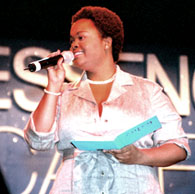
In the words of Jill Scott whose remarks introduced the panel discussion: “What if we created a world free of pollutants? A world where there were fresh air, not filled with factory sludge. Clean water with that sweet pure taste, the kind that our grandparents drank with both hands on summer trips to the South. We would be healthier, stronger, maybe even happier, not having to balance the toxins in our systems with medications in order to make those impurities less palpable. What if we could wipe the slate clean, take out the things that harm us?”
She continued: “Ladies, Sisters, queens, it is the same way with the representation of our sexuality in the music today. It is dirty, unappealing, inadequate, unhealthy and polluted.” She added further adjectives: “Degrading, humiliating and quite frankly exhausting. It’s not even clever and God forbid creative.”
She maintained that it was not about judgment of others, but rather choosing what we will allow in our world: our present and future.
“There is more than just our sexuality. Challenge the artists. Challenge the directors. Challenge the choreographers. Challenge the radio stations. Challenge the music industry. With what? Your purchasing power. When they see their money getting low, real low, we can force things, we can change things. Or we can watch and listen” she said with slow measure, “as our sons and our daughters and our people define themselves based on dirty water.”
(Click here to read Minister Farrakhan’s keynote address.)












